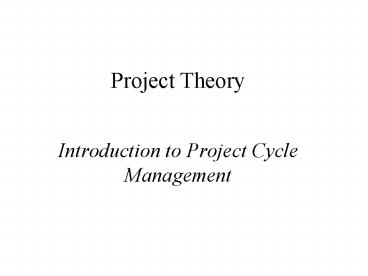Project Theory Introduction to Project Cycle Management - PowerPoint PPT Presentation
1 / 15
Title:
Project Theory Introduction to Project Cycle Management
Description:
Analysis of the organisation, its values, activities and relevancy. Own motivation ... is carefully planned and designed to achieve a particular aim /Oxford Dictionary ... – PowerPoint PPT presentation
Number of Views:197
Avg rating:3.0/5.0
Title: Project Theory Introduction to Project Cycle Management
1
Project TheoryIntroduction to Project Cycle
Management
2
Project phases
- Assessment
- Planning
- Implementation
- Evaluation
- Project Cycle Management (PCM)
3
1. Assessment (of needs, situation)
- Observing a problem
- Analysing it
- Defining the need
- Deciding on an action
- Answering W-questions (Laswell)
4
W-questions
- Who, for whom, with whom, etc.?
- What?
- Why?
- Where?
- When?
- How/Wie?
5
2. Planning (1)
- Needs Analyses (!!!) formal, why
- Analysis of the organisation, its values,
activities and relevancy - Own motivation
- Definition of aims (general) and concrete
objectives
6
Planning (2)
- Selection of methodology, activities
- Plan of activities schedule
- Resources human, financial, material, time
- Organisation of the project team, partners
- Outline of the project/project fiche
- Risks assessment strategy
7
Concrete objectives
- SMART
- Specific
- Measurable
- Achievable
- Realistic
- Timed
8
Project fiche/outline (1)
- Project name, location, duration
- Rationale (stating needs)
- Organisations priorities, funders priorities
- Target group
- General aim
- Concrete/specific objectives
- Methodology/strategy
- Plan of activities
9
Project fiche/outline (2)
- Main outcomes
- Expected results
- Added value of the project
- Evaluation criteria, technique
- Sustainability, multiplicatory effects
- Resources financial (budget), material (budget),
human (team and partners) - Publicity
- Information about the organisation (contact info)
10
3. Implementation
- Implementing and executing activities
(conferences) - Management resources human, material/technical,
financial, time - PR and communication
- Team work
- Book-keeping and accounting
- Process documentation, records
- Continuous monitoring, feedback
11
4. Evaluation
- Final evaluation vs. continuous monitoring
- Using originally planned methods
- Summing up results, objectives, activities,
fulfilled expectations - Formal documentation (reports, brochures)
- Internal lessons documented (manuals)
- Acknowledgments
- Closing accounting
- Follow-up
12
Keys to success
- Balance between organisational capacity and tasks
to be conducted - Full team participation in all phases
- Shared notion of objectives
- Involvement and support from the target group(s)
- Realistic plans of activities, budget
- All formalities respected, proper techniques
means, but not the end in itself! - Necessary skills (eg. communication)
13
Definition of a project
- A concept which serves to organise action
/Project Management T-kit/ - An individual or collaborative enterprise that is
carefully planned and designed to achieve a
particular aim /Oxford Dictionary/
14
Further readings
- Project Management T-kit (2000), Council of
Europe - Vademecum
- www.ngomanager.org
15
David Stulíkdavid.stulik_at_peopleinneed.cztel
420-603-149-741































